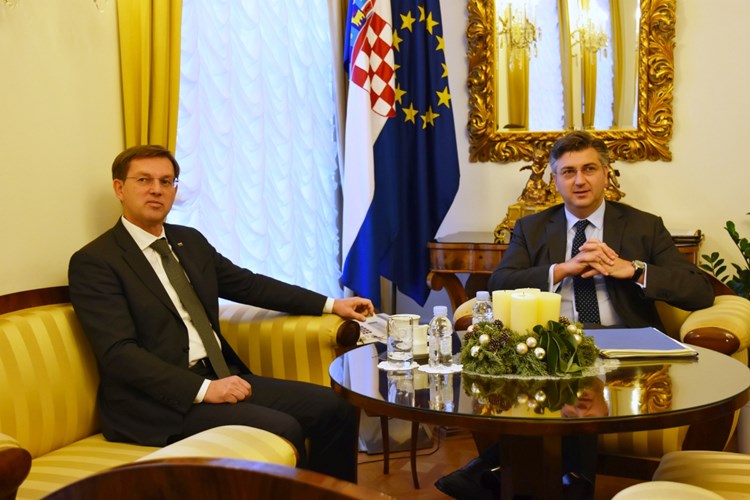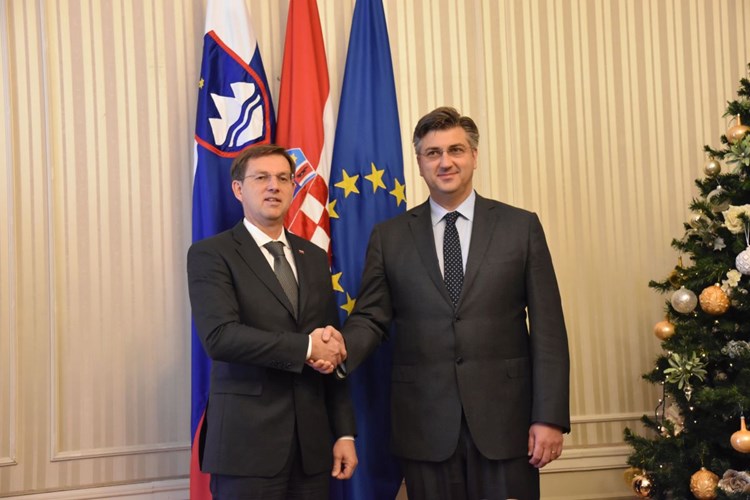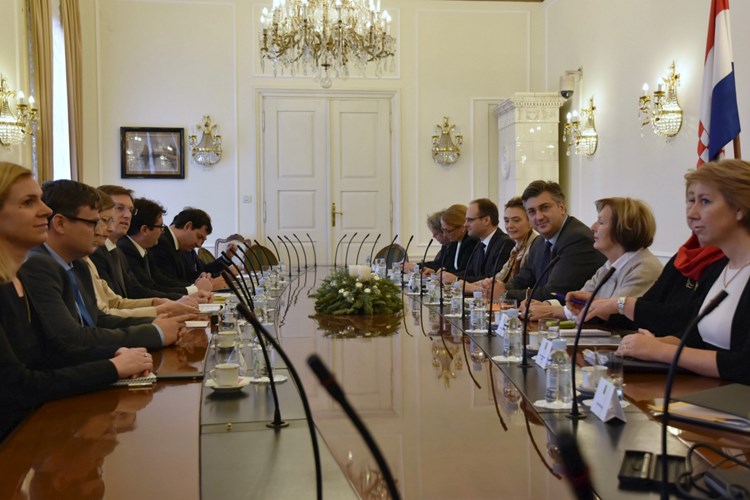- Published: 19.12.2017.
Prime Minister Plenković: I Believe We are Close to Reaching a Solution for the Border Issue, Acceptable to Both Sides
Prime Minister of the Republic of Croatia Andrej Plenković met with the Prime Minister of the Republic of Slovenia Miro Cerar, who was on a working visit to the Republic of Croatia, at the seat of the Croatian Government today.
“I am happy that we have had the opportunity to emphasize once again that Croatia and Slovenia have many things in common. The two countries and the two peoples have never had a serious problem or conflict in their centuries-old history,” Prime Minister Plenković said in the introduction to his statement following the meeting.He added that it was important to point out that the two countries are allies in the North Atlantic Treaty Organization, partners within the European Union and two countries that want to address open issues in an open and mature way, maintaining good neighbourly relations.
According to Prime Minister Plenković, the two prime ministers discussed a number of topics today relevant to Croatian-Slovenian relations: the political framework for dialogue, enhancing the already good and broad economic cooperation, the position of Croats in Slovenia and Slovenians in Croatia, highlighting a mutual desire for both minorities to feel good and have all the support of the country they live in.
As far as the border issue is concerned, Prime Minister Plenković reminded that there had been various attempts to resolve it, with the last attempt being the 2009 agreement on the arbitration process, which Croatia abandoned in 2015, due to well-known reasons.
“As far as Croatia is concerned, the border issue is on the table, we wish to resolve it,” Prime Minister Plenković pointed out.
He said that Croatia proposed to the Slovenian side a legal framework that could be the basis for finding a solution and reaching an agreement on a mutually acceptable border both on land and at sea, without going into the specifics.
“If we look at things realistically, there is a high level of agreement between the two countries on what the border should ultimately look like,” said Prime Minister Plenković.
Prime Minister Plenković also said that Croatia wanted Croatian and Slovenian experts to continue their dialogue. “We are prepared to behave in such a way as to avoid any unilateral moves that could lead to an incident between the two countries. This is Croatia's firm and clear position,” said Plenković.
He recalled that both prime ministers showed a great level of responsibility in April when they found a solution to the heavy traffic at the border crossings, after the revised Schengen Borders Code entered into force, agreeing to switch from systematic to targeted checks.
“In line with that kind of approach, I expect that our dialogue will continue and that we will reach a solution for the border issue through discussion and agreement,” said Plenković.
Prime Minister of the Republic of Slovenia Miro Cerar said that this meeting was a continuation of the talks that had begun immediately after the award of the Arbitral Tribunal that had defined the border between Slovenia and Croatia on land and at sea. Slovenia considers this decision to be binding for both states and therefore intends to respect and implement it, said Prime Minister Cerar, adding that he expected the same from the friendly Croatian state.
Prime Minister Cerar said that he discussed some other topics with the Croatian Prime Minister, but the main topic was the arbitral award. “I came to Zagreb today primarily with the intention of discussing this issue that is important for both countries, given that the deadline for the preparation of the arbitral award implementation expires very soon, on 29 December. I understand the standpoint presented by my colleague, Mr Plenković that the arbitral award is not binding for Croatia, although I cannot agree with it, personally and as the Prime Minister of the Republic of Slovenia,” Cerar said.
He added that Slovenia respects the arbitral award absolutely and believes that it is binding for both countries.
“I believe that the very fact that we have been trying to negotiate the course of the border at these disputed points for some twenty years proves that the legal path through the agreement on arbitration is the only way to reach a binding solution as the only possible way to close the issue and help establish, on that point, an even better level of trust between the two countries. The truth is that we are two friendly countries and good neighbourly relations are one of Slovenia's goals, and there are many examples of that,” said Prime Minister Cerar.
He said that the relations between Slovenia and Croatia are multi-layered, at times excellent, at times good, but when it comes to the border, there is a lack of trust and it is therefore important to reach an agreement and find the right solution. “I am personally convinced that the rule of law, and the respect for the rule of law, is the civilisation norm and a fundamental value of the European Union to which both countries belong and that is what we all have to be committed to if we want to coexist in a constructive way”, he stated.
“The only way forward for Slovenia is to respect the arbitral award and to implement it together when cooperation is needed. The arbitral award is an indivisible whole and must be respected as such. It covers two different dimensions, one being the sea which the Arbitral Tribunal delineated by a very clear line that does not require any particular implementation arrangements. Naturally, the situation is different on the land border, which calls for a formation of a joint mixed committee that will carry out the demarcation, naturally within the framework of the arbitral award, considering there are still some minor adjustments to be made, which would be jointly agreed upon, in accordance with the arbitral award", said Cerar.
He expressed regret due to “the friendly Croatia not having revised its opinion and refusing to accept the arbitral award” during these six months. Slovenia insists on the application of the arbitral award, to which we are obliged by international law, as well as European law, because we are also aware of the European aspect of the award”.
“Slovenia has not and will not incite any incidents neither at sea nor on land. We consider it very important that there are no incidents, that communication is normal, that the border regimes are normal, that there is friendly contact between municipalities and the states are functioning properly in that regard. Slovenia will not incite incidents even after the arbitration implementation deadline expires, however, it shall commence with the procedures it has been preparing for these six months, which implies the implementation to the extent that Slovenia is able to carry out on its own. Where implementation requires agreement, we will certainly respect that, which is why we will keep the dialogue going so that we can seek agreement on the application of the award”, stated Cerar.
“As far as 29 December is concerned, for Croatia it is a date like any other in terms of international law”, Andrej Plenković, the Prime Minister of the Republic of Croatia, responded to the question of what he expects on 29 December, date on which the deadline for the implementation of the arbitral award expires.
Plenković explained that he understands that Slovenia considers the arbitral award to be binding, however, on the contrary, Croatia does not consider that the award binds it, keeping in mind there are well-known formal and legal reasons for Croatia’s withdrawal from the arbitration process.
“Those are the facts. However, I think that through dialogue, discussion and understanding of positions of both Slovenia and Croatia we can come closer to a final solution on the border issue that would be acceptable to both parties. This is the fundamental meaning of the message that the Government of the Republic of Croatia has sent to Slovenia today,” emphasized Plenković.
The Croatian Prime Minister maintains it would be also good for the mutual relations of the two countries and as a message to the public to soften the viewpoints to some extent because today they can be simplified as meaning that Slovenia solely supports the implementation of the arbitral award and that Croatia, based on the decision of the Croatian Parliament, does not consider that arbitral award to be binding and valid.
“In order for us to reach agreement from these two positions, we need to maintain discussions, reach an understanding on elements that are dividing us, and I would like to point out once again that there are more issues that connect us, not only in general but also when it comes to determining the borders. I am convinced that we can only resolve this issue through continuous dialogue,” said Plenković.
As a token of good will, Plenković highlighted today’s agreement between the two prime ministers to begin the reconstruction of bridges on two border crossings, Kaštel-Dragonja and Obrež-Božakovo.
“These are the signals that we, as responsible prime ministers of the two countries, are emitting so as to show that we are aware that we need to do everything in our power to improve the life of our people on both sides of the border,” he stated.
He said that the issues dividing Croatia and Slovenia are perceived as much larger than the strain that they are realistically putting on the relations between the two countries.
“This is why I am glad that in the last six months the Croatian public, as well as Croatian politicians, have adopted a much more mature approach to this topic. An approach much more mature than in numerous stages in the last 25 years. This is the manner in which we wish to conduct the dialogue and to seek a solution. Our message is – the border, regardless of what it will look like in the end, needs to be set in a way that is acceptable to both countries and that it can be internally approved by both parliaments with the appropriate majority vote,” said Plenković.
The press was interested to find out what the legal framework that Croatia offered to Slovenia for the resolution of these issues was.
Plenković said that Croatia wished to try and agree on a protocol regarding the state border which would include several key elements. One of them would concern the land border, another one the sea border, the third would concentrate on the navigation regime in Croatian waters beyond the Bay of Savudrija, the fourth on forming a mixed committee which would address important aspects of the identification and demarcation of the border, while the fifth would concern the manner in which such a document would be submitted to the parliaments of both countries and ratified in the end.
When asked whether Croatia plans to implement the arbitral award, Andrej Plenković made it clear that it does not.
When asked what he considers to be the greatest success of today’s meeting, Prime Minister Plenković said that it was the well-meaning, mature and open European and neighbourly approach which characterises mutual relations.
He emphasised that, as regards the border (particularly the land border), they agree on more than 90 percent of the border.
“An important message to be taken from today’s meeting is that we have shown that there is dialogue and that we have identified the issues on which we disagree, that we see where there is room for convergence of our viewpoints,” added Prime Minister Plenković.
As regards the lawsuit against Croatia to be brought to the Court of Justice of the European Union in Luxembourg, announced by the Slovenian Minister of Foreign Affairs, the press was interested to find out how much sense it even makes at that particular court, considering it primarily focuses on the application of EU law.
Prime Minister Andrej Plenković reminded of the issue that brought about the resignation of the Slovenian judge and the Slovenian Government agent from the arbitration process.
“That was the moment in which that process lost credibility for Croatia. I emphasize that we entered that process in good faith in 2009, at the time when we were negotiating membership in the EU and when we were faced with 14 chapters in which we could not advance. Throughout several years, Croatia hired numerous domestic and international experts in international law, invested significant financial resources in that process, and we regret that it has not resulted in a decision we would be willing to accept. We would have had a sense of obligation to comply with the decision, regardless of what it was, had we been able to stay involved in the process to the very end. It is very important that the Slovenian and Croatian public understand this. Croatia did not exit the process just because it did not wish to take part in it any more. It exited for a specific reason, thoroughly substantiated in the respective decision of the Croatian Parliament and in its communication to Slovenia and our other international partners. Therefore, I believe that a lawsuit before the Court of Justice of the European Union is not the way to the future. There is no legal basis for it at this moment,” said Prime Minister Plenković.
He reiterated that both countries need to agree with the arbitral award so that it could be implemented, even in ideal conditions and in the absence of any problems.
“Following detailed discussions between Miro and I, I believe that when it comes to the very substance, we are now probably much closer to finding a final solution than ever before. But this requires a certain level of flexibility from both sides. We need to show that we are mature and able to resolve this issue,” said Prime Minister Plenković.


